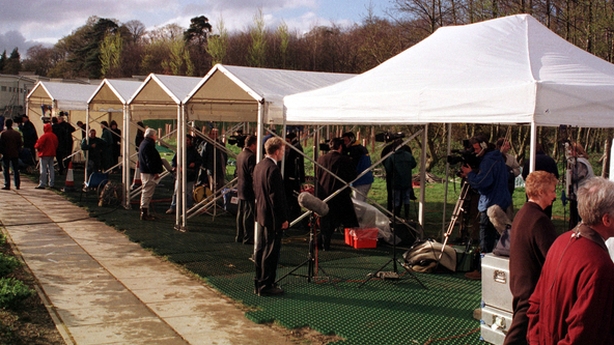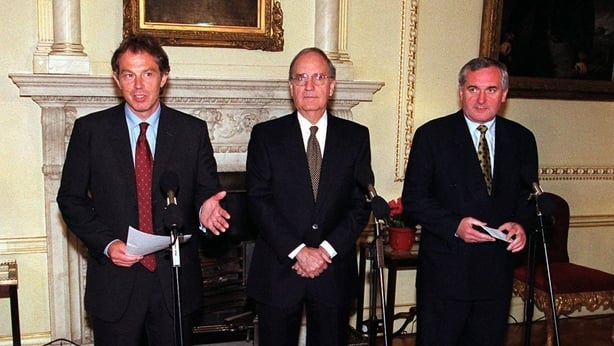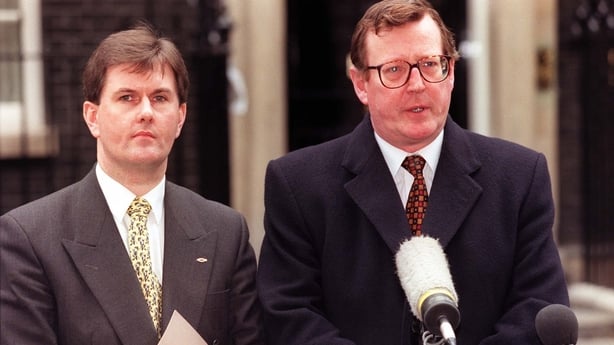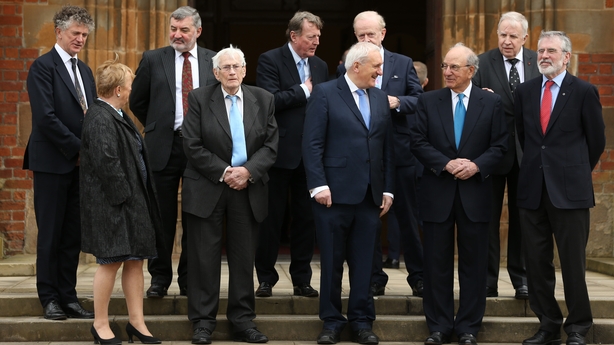Bryan Dobson, who still has his copy of the Good Friday Agreement, reflects on his time reporting from Belfast on the historic day in April 1998 when the deal was signed.
It had been threatening to come down all day. Temperatures dropped and the sky darkened over east Belfast. Inside the modern bunker-like office building, the lights had come on early. Jacketless figures, sleeves rolled up, could be seen pacing up and down behind the plate glass windows.
The deal was supposed to have been signed-off hours ago, but the hours were passing and the formal deadline was already breached. A final agreement backed by all the participants - at what were officially termed the multi-party talks - was proving difficult to achieve.
In the rumour mill that was the press centre, theories of what might have gone wrong were abundant. Facts, as ever, remained scarce.

And now the snow was falling. Light flakes drifted down on Castle Buildings. On the encircling tarmac, on the wire fencing that kept reporters at a distance, on the parked cars, on the trees and lawns of the Stormont estate.
Flakes of snow drifted down on the figures gathering at the entrance to the building, where microphones and cameras were being set up, ready for an announcement. Snowflakes dissolved as they landed on people and on the damp ground.
That morning, at the start of this remarkable day, Seamus Mallon of the SDLP, later Deputy First Minister in the Northern Ireland power-sharing executive, told me in a voice of barely suppressed emotion: "We've done it."
The deal had been cinched, he confidently believed, as he smoked a cigarette with a small group of supporters just outside the perimeter fence.
In his eyes I could see decades of struggle, years of hard bargaining and pleading for the violence to stop. He later coined the term 'Sunningdale for slow learners’ to describe the agreement - a reference to an earlier failed power-sharing initiative brought down by IRA bombs and unionist opposition. But the mood this Friday morning was very different.
Talks chairman, former US senator George Mitchell. had set Thursday as the deadline for a deal, telling the parties he would leave on Good Friday to return to his family in the United States.

By forcing the pace after months of negotiations, Mr Mitchell took a gamble. A few issues remained to be tied down but the deal was now clear to everyone. The moment of decision had arrived.
Taoiseach Bertie Ahern and British prime minister Tony Blair had flown into Belfast earlier in the week to stake their political capital on reaching an agreement. Together with Senator Mitchell and the Northern Ireland parties, it looked like they might just pull it off. In Washington, US President Bill Clinton stood by ready to persuade.
So the expectation in Belfast was that the stars had aligned. A peace settlement was on the table. It could hardly fail at this late stage, could it? By late afternoon on that Good Friday in 1998, some doubts were creeping in.
The night before, I had unwisely told viewers to RTÉ television that they would likely be reading about the agreement in their morning newspapers. But when morning arrived, those inside Castle Buildings were still talking, still striving for the deal.
There was huge pressure on Ulster Unionist leader David Trimble to give his assent to the agreement. But divisions were opening in the unionist camp.

Jeffrey Donaldson, now leader of the DUP, dramatically departed the negotiations refusing to be party to the impending deal, indicating that Mr Trimble was ready to sign up even though his deputy leader John Taylor had earlier said he wouldn’t touch the draft agreement with a 40ft barge pole.
But that was a couple of days ago, and the unionist leadership believed he had secured sufficient concessions to come on board.
And then it came, like these things often do, in a rush. The final details nailed down, last minute reassurances given and the cameras and microphones invited in to record the momentous and the mundane.
Handshakes, smiles, relief, anxiety too; the politicians knowing a job of work lay ahead to persuade their constituencies to endorse the Belfast Agreement.
And I've collected a few interesting signatures over the years, most recently Monica McWilliams. Thinking this weekend of those no longer with us. https://t.co/wnecAdIo9n pic.twitter.com/Ps8r59zKy1
— Bryan Dobson (@BryanNewsatOne) April 8, 2023
There would be a difficult referendum campaign ahead in Northern Ireland to convince unionist voters to back the accord.
The DUP never signed up to the Good Friday dispensation. IRA foot-dragging on arms decommissioning eventually undermined David Trimble and the pro-agreement Ulster Unionists, helping the DUP overtake their rivals at the ballot box.
But that Good Friday, standing outside Castle Buildings in the gathering gloom, Bertie Ahern and Tony Blair hailed a historic agreement. For once the term was neither overblown nor misapplied.
I still have my copy of the agreement, handed to me by a Northern Ireland Office press officer moments before I began broadcasting the RTÉ Nine O’Clock news live from Castle Buildings.
The soft-bound booklet was literally hot off the press, warming my hands while in my earpiece the director counted down to the opening music and the headline sequence.

Earlier in the scramble for interviews with the emerging politicians, a veteran news cameraman could be seen wiping away his tears and asking why so many funerals, why so many had to die before this day was achieved.
Perhaps, to quote James Joyce: "He heard the snow falling faintly through the universe and faintly falling, like the descent of their last end, upon all the living and the dead."
The Belfast/Good Friday Agreement was the work of politics, a vindication of the political process, of late nights, of sometimes messy compromises, of give and take, of judging when to hold firm and when to concede.
Each generation comes to its own terms with the present and the past.
Hume, Trimble, Adams, McWilliams, Ervine, Alderdice, and many more besides resolved that April day to step out from behind the old ramparts and begin the job of making a new Northern Ireland and a new Ireland, a job that remains very far from complete.
We need your consent to load this rte-player contentWe use rte-player to manage extra content that can set cookies on your device and collect data about your activity. Please review their details and accept them to load the content.Manage Preferences


